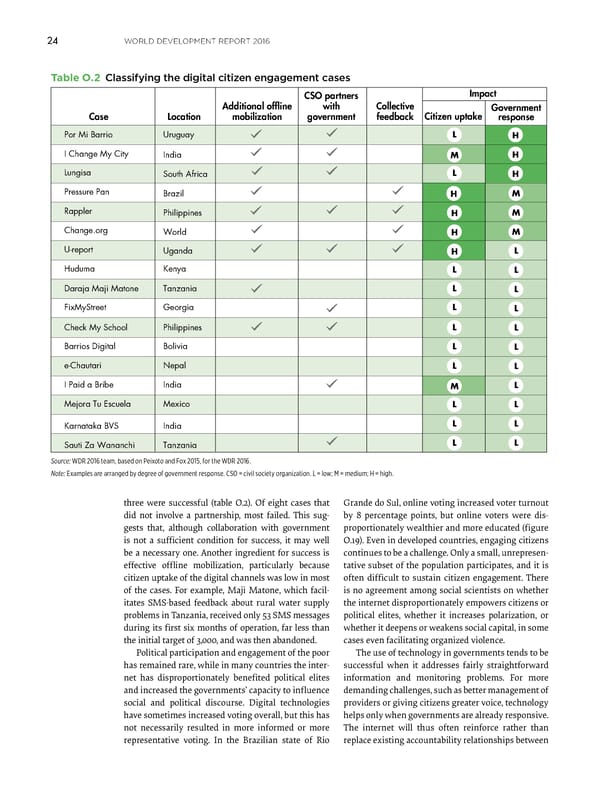WORLD DEVELOPMENT REPORT 2016 24 Table O.2 Classifying the digital citizen engagement cases CSO partners Impact Additional offline with Collective Government Case Location mobilization government feedback Citizen uptake response Por Mi Barrio Uruguay L H I Change My City India M H Lungisa South Africa L H Pressure Pan Brazil H M Rappler Philippines H M Change.org World H M U-report Uganda H L Huduma Kenya L L Daraja Maji Matone Tanzania L L FixMyStreet Georgia L L Check My School Philippines L L Barrios Digital Bolivia L L e-Chautari Nepal L L I Paid a Bribe India M L Mejora Tu Escuela Mexico L L Karnataka BVS India L L Sauti Za Wananchi Tanzania L L Source: WDR 2016 team, based on Peixoto and Fox 2015, for the WDR 2016. Note: Examples are arranged by degree of government response. CSO = civil society organization. L = low; M = medium; H = high. three were successful (table O.2). Of eight cases that Grande do Sul, online voting increased voter turnout did not involve a partnership, most failed. This sug- by 8 percentage points, but online voters were dis- gests that, although collaboration with government proportionately wealthier and more educated (figure is not a sufficient condition for success, it may well O.19). Even in developed countries, engaging citizens be a necessary one. Another ingredient for success is continues to be a challenge. Only a small, unrepresen- effective offline mobilization, particularly because tative subset of the population participates, and it is citizen uptake of the digital channels was low in most often difficult to sustain citizen engagement. There of the cases. For example, Maji Matone, which facil- is no agreement among social scientists on whether itates SMS-based feedback about rural water supply the internet disproportionately empowers citizens or problems in Tanzania, received only 53 SMS messages political elites, whether it increases polarization, or during its first six months of operation, far less than whether it deepens or weakens social capital, in some the initial target of 3,000, and was then abandoned. cases even facilitating organized violence. Political participation and engagement of the poor The use of technology in governments tends to be has remained rare, while in many countries the inter- successful when it addresses fairly straightforward net has disproportionately benefited political elites information and monitoring problems. For more and increased the governments’ capacity to influence demanding challenges, such as better management of social and political discourse. Digital technologies providers or giving citizens greater voice, technology have sometimes increased voting overall, but this has helps only when governments are already responsive. not necessarily resulted in more informed or more The internet will thus often reinforce rather than representative voting. In the Brazilian state of Rio replace existing accountability relationships between
 World Development Report 2016 Page 37 Page 39
World Development Report 2016 Page 37 Page 39